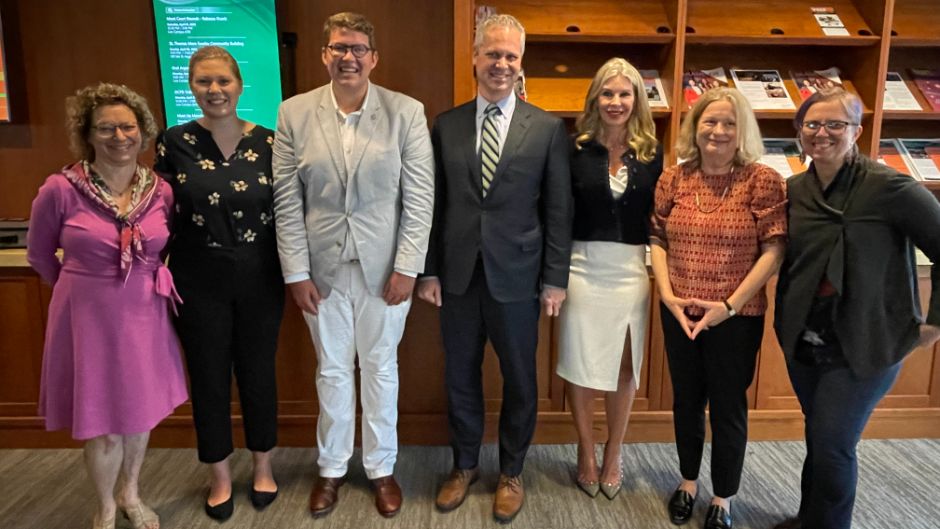Two of the country's leaders in environmental law - Matt Leopold, the former General Counsel of the Trump EPA and current partner at Hunton Andrews Kurth, and Lisa Heinzerling, a former leader within the Obama EPA and Brennan Professor at Georgetown Law – recently spoke at Miami Law. Both worked directly on the issues at play in the case and are two of the foremost experts on the topic. The discussion was moderated by the Honorable Bronwyn Miller, J.D. '97, and judge on the Florida 3rd District Court of Appeal.
Different Perspectives, Common Purpose
To kick off the discussion, the two co-sponsoring student organization presidents, Catherine Dremluk and Randy Fitzgerald, stood up at the beginning to create a tone of mutual respect and understanding for the audience of students with vastly different political viewpoints.
This laid the groundwork and tone for the thought leaders to engage in insightful discussion and debate and reflect on the case and the future of environmental law and the administrative state.
"This panel conversation gave students at Miami Law the opportunity to engage in respectful, although sometimes difficult, conversations on an important topic with great impacts on the future of our community and our country," said Randy Fitzgerald, president of the Federalist Society.
Environmental Law Society president, Catherine Dremluk, agreed. "Whether you're on the left, or the right, or somewhere in the middle, you heard something today you disagreed with, and that's a good thing!"
Takeaways from Panelists
The panelists covered many aspects of the case, decided last year in a 6 to 3 majority by the United States Supreme Court. A few highlights from the discussion include:
Matt Leopold: "If an agency is allowed to take vague and ambiguous language, and fill it with just about anything, . . . the court should look at that with skepticism. I think you should look at [West Virginia v. EPA] as a burden-shifting case… that an agency needs to point to clear statutory language… [This burden-shifting is a] higher burden for agencies [and also] shifts the burden to Congress to deal with problems like climate change… Congress can act right now… a functioning legislature should do something like that, and I don't think the burden on Congress is impassable."
Lisa Heinzerling: "West Virginia v. EPA is consistent with the trend of opinions the Supreme Court has issued in recent years that are very aggressive." "[The Court continues] shrinking Congress' power and enlarging their own… the Court is aggrandizing their own power at the expense of another branch." "It is clear after this case that Congress has to predict in advance that there will be a problem, like climate change. That is an incredibly powerful doctrine. This disempowers Congress to act; for Congress to act it needs to speak with crystal clarity. This is inherently not possible if Congress is trying to empower an agency to take on problems or deploy new solutions."
Dean of Students Janet Stearns attended and said, "The panelists were excellent. The questions from our students were excellent. And students from all sides of the political spectrum were engaged in a deep debate on legal doctrines, learning from and listening to one another. I am grateful to our students who modeled civility and mutual respect while learning about the competing authority of our three branches of government in addressing climate change. This is the ideal, and we really hit it out of the park today at UM Law.”
In reflecting on the event's success, Fitzgerald added, "We encourage our fellow' Canes to continue the conversation — not just with those they agree with, but with others who think differently from them, too. Respectful disagreement is a good thing, as we work together to find solutions to the challenges we face."
The Federalist Society and the Law Activity Fee Allocation Committee funded this important event.
More on the 55+ student organizations at Miami Law

